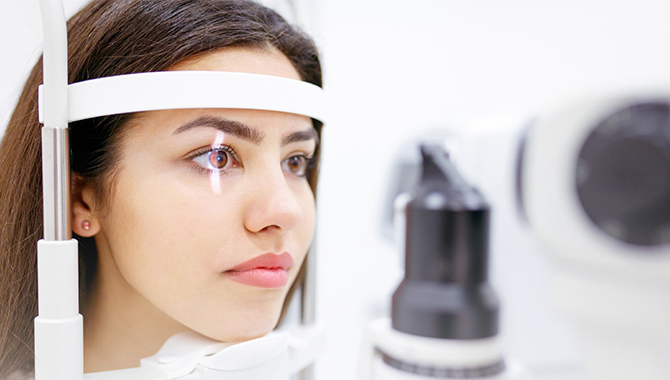
How to Reduce Myopia Naturally and Effectively: A Complete Guide
Jul 31, 2025
Myopia, commonly known as nearsightedness, is a vision problem where you can see objects nearby but have difficulty seeing distant objects. It occurs when the shape of the eye causes light rays to focus in front of the retina instead of directly on it. With the increasing use of digital screens, myopia has become more common worldwide, even among children.
Many people wonder if it’s possible to reduce or reverse myopia naturally and effectively without surgery or glasses. While myopia cannot be completely cured in all cases, there are natural ways to slow its progression, improve visual comfort, and strengthen eye health.
This article explains practical tips, lifestyle changes to reduce myopia naturally, diet suggestions, and prevention methods, along with FAQs to help you understand how to naturally support better vision.
Understanding Myopia and Its Symptoms
Myopia, commonly known as nearsightedness, is a vision condition where objects nearby appear clear, but distant objects look blurry. It occurs when the shape of the eye is slightly elongated, or the cornea is curved more than normal, causing light rays to focus in front of the retina instead of directly on it. This improper focusing leads to difficulty seeing faraway objects.
Myopia develops when:
-
The eyeball is elongated, causing light to focus in front of the retina.
-
The cornea or lens is too curved, leading to blurry distant vision.
Common Symptoms of Myopia
-
Blurry vision for distant objects
-
Headaches from eye strain
-
Squinting frequently
-
Difficulty seeing at night or while driving
Factors that contribute to myopia include genetics, excessive screen time, poor reading habits, lack of outdoor activities, and eye muscle weakness.
Can Myopia Be Reduced Naturally?
Medical science suggests that there is no guaranteed way to completely reverse myopia naturally, especially in moderate to high cases. However, natural remedies, exercises, and lifestyle changes can help:
-
Slow down the progression of myopia, especially in children.
-
Reduce dependence on glasses in mild cases.
-
Improve overall eye health and vision clarity.
For more advanced treatment or correction, consulting specialists like Dr. Tushar Grover at an Eye Hospital in Delhi is recommended for professional guidance.
Eye Exercises for Myopia
Eye exercises are simple activities that can help relax the eye muscles, improve focus, and reduce strain caused by prolonged near work. While these exercises may not completely reverse myopia, they can slow down its progression and promote better visual comfort. Below are some commonly recommended exercises:
-
Focus Change Exercise: Look at an object close to you, then shift your gaze to something far away, repeating this several times.
-
Palming Technique: Rub your hands together to generate warmth and gently place them over your closed eyes to relax the muscles.
-
Blinking Exercise: Practice blinking every few seconds to keep the eyes moist and reduce dryness caused by screen use.
-
Eye Rolling: Slowly roll your eyes in circular motions to enhance flexibility and reduce stiffness.
-
20-20-20 Rule: Every 20 minutes, take a 20-second break to look at something 20 feet away to relax the eyes.
These exercises are beneficial because they train the eye muscles to adapt better to changing focus, reduce fatigue from close-up activities, and encourage proper blinking, which keeps the eyes lubricated. Performing these exercises consistently, especially for children or people who spend long hours on screens, can help in managing the effects of myopia naturally.
Lifestyle Changes to Improve Myopia Naturally
Making certain lifestyle adjustments can help prevent worsening of myopia:
-
Limit Screen Time: Avoid prolonged use of mobile phones or computers.
-
Maintain Proper Reading Distance: Keep books at least 14–16 inches away from your eyes.
-
Ensure Adequate Lighting: Avoid reading or working in dim light.
-
Take Regular Eye Breaks: Look outside or focus on distant objects often.
-
Increase Outdoor Activities: Spending time outdoors in natural light has been shown to slow myopia progression in children.
-
Good Posture: Maintain a comfortable distance from screens and sit upright to reduce eye strain.
Diet and Nutrition for Healthy Eyes
A balanced diet rich in vitamins, antioxidants, and minerals supports eye health and may help slow down vision deterioration:
-
Vitamin A: Found in carrots, spinach, and sweet potatoes; supports retina health.
-
Vitamin C and E: Protect against oxidative damage (citrus fruits, nuts, seeds).
-
Omega-3 Fatty Acids: Reduce dry eyes and inflammation (fish, flaxseeds).
-
Zinc and Lutein: Found in eggs, green leafy vegetables, and beans; essential for vision protection.
-
Hydration: Drink plenty of water to keep eyes lubricated.
While diet alone cannot cure myopia, it strengthens the eyes and prevents further damage.
Natural Remedies and Good Habits
-
Proper Sleep: Adequate rest reduces eye strain and refreshes the eyes.
-
Eye Massage: Gently massaging around the eyes can improve blood circulation.
-
Warm Compress: Applying a warm cloth over closed eyes can ease tension.
-
Avoid Eye Rubbing: Reduces risk of infection and corneal damage.
-
Regular Eye Check-ups: Early detection of worsening vision helps in timely intervention.
For severe or progressive myopia, expert guidance at Vision Eye Centre can help explore corrective measures like LASIK surgery, contact lenses, or orthokeratology lenses.
How to Prevent Myopia in Children and Adults
Prevention is always better than a cure. Here are some ways to reduce the risk:
-
Encourage outdoor play for at least 1–2 hours daily.
-
Avoid prolonged near work like reading or using gadgets for long hours.
-
Maintain a healthy diet with eye-friendly nutrients.
-
Schedule regular eye check-ups to monitor vision changes.
-
Ensure proper lighting and posture during reading or working.
Myopia Treatment Options (When Natural Methods Aren’t Enough)
Natural remedies can only help to a certain extent. If vision problems worsen, medical treatments are necessary:
-
Prescription Glasses or Contact Lenses: The most common and immediate solution.
-
Orthokeratology (Ortho-K): Special contact lenses worn overnight to temporarily reshape the cornea.
-
Refractive Surgery (LASIK, PRK, SMILE): Permanent correction for suitable candidates.
-
Low-Dose Atropine Eye Drops: Used in children to slow myopia progression.
Frequently Asked Questions
1. How to reduce myopia naturally at home?
You can reduce eye strain and slow myopia progression through eye exercises, a nutrient-rich diet, outdoor activities, and limiting screen time, but complete natural reversal is unlikely.
2. How to cure myopia naturally and effectively without glasses?
There’s no proven natural cure, but following good habits, practicing focusing exercises, and maintaining a healthy lifestyle can improve eye function and reduce dependency on glasses.
3. Can myopia be reversed naturally?
Mild cases may improve slightly with proper care, but most myopia cannot be fully reversed naturally. Treatments like corrective lenses or LASIK are often required for permanent results.
4. Do eye exercises for myopia work?
Eye exercises can strengthen eye muscles, improve focus and flexibility, and reduce fatigue, but they cannot permanently change the eye’s shape or completely cure myopia.
5. How to prevent myopia from getting worse?
-
Take frequent breaks during near work.
-
Spend more time outdoors.
-
Use proper lighting.
-
Maintain a healthy diet and posture.
-
Get regular eye check-ups for early intervention.
6. Can diet alone fix myopia?
No, diet cannot correct myopia, but nutrients like Vitamin A, Omega-3s, and Zinc support overall eye health and may help in slowing its progression.
7. At what age does myopia stop worsening?
Myopia usually progresses until the mid-20s, but early control measures and professional treatments can help slow or stop its progression in children and young adults.

